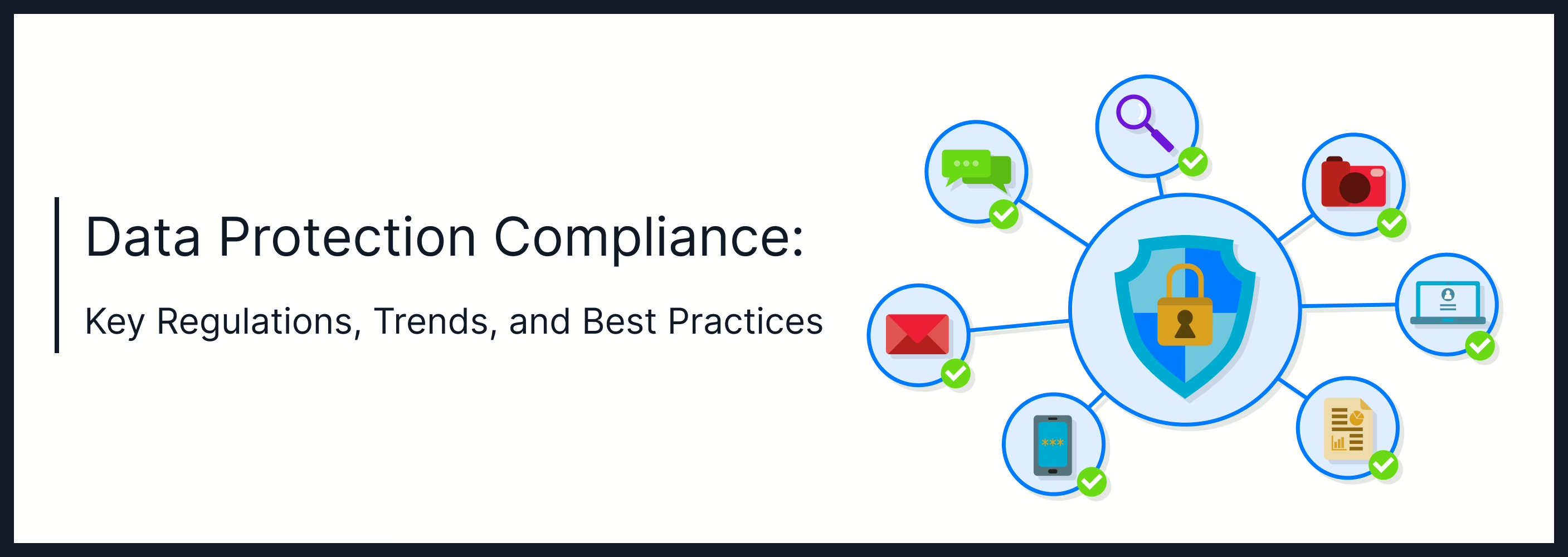
Oct 15, 2024 Information hub
Data Protection Compliance: Key Regulations, Trends, and Best Practices for Businesses
In today’s digital age, data is one of the most valuable assets for businesses. From customer information to proprietary business data, organizations rely heavily on data to drive decision-making, improve services, and maintain a competitive edge. However, with the increasing reliance on data comes the responsibility to protect it. Data protection compliance has become a critical concern for businesses of all sizes, as regulatory bodies worldwide have introduced stringent laws to ensure that personal and sensitive data is handled with care.
The consequences of failing to comply with data protection regulations can be severe, ranging from hefty fines to reputational damage. In this blog post, we will explore the importance of data protection compliance, the key regulations businesses need to be aware of, and practical steps to ensure compliance. We will also discuss current trends, challenges, and future developments in the field of data protection.
The Importance of Data Protection Compliance
Why Data Protection Matters
Data protection is not just about avoiding fines or legal repercussions; it is about building trust with customers, partners, and stakeholders. In an era where data breaches and cyberattacks are becoming increasingly common, consumers are more concerned than ever about how their personal information is being used and protected.
- Trust and Reputation: Businesses that prioritize data protection are more likely to earn the trust of their customers. A single data breach can lead to a loss of customer confidence, which can be difficult to recover from.
- Legal Obligations: Many countries have enacted data protection laws that require businesses to implement specific measures to protect personal data. Non-compliance can result in significant financial penalties.
- Operational Efficiency: Implementing data protection measures can improve operational efficiency by ensuring that data is stored, processed, and accessed securely. This can reduce the risk of data loss or corruption.
The Global Landscape of Data Protection Regulations
Data protection compliance is not a one-size-fits-all approach. Different countries and regions have their own regulations, and businesses that operate internationally must navigate a complex web of legal requirements. Some of the most prominent data protection regulations include:
- General Data Protection Regulation (GDPR): Enforced in the European Union, the GDPR is one of the most comprehensive data protection laws in the world. It applies to any business that processes the personal data of EU citizens, regardless of where the business is located.
- California Consumer Privacy Act (CCPA): The CCPA is a state-level law in the United States that gives California residents greater control over their personal data. It requires businesses to disclose what data they collect and how it is used.
- Personal Information Protection and Electronic Documents Act (PIPEDA): This Canadian law governs how businesses collect, use, and disclose personal information in the course of commercial activities.
- Brazil’s General Data Protection Law (LGPD): Similar to the GDPR, Brazil’s LGPD regulates the processing of personal data and grants individuals rights over their data.
Key Components of Data Protection Compliance
1. Data Collection and Consent
One of the fundamental principles of data protection compliance is that businesses must obtain explicit consent from individuals before collecting their personal data. This means that businesses must clearly inform individuals about what data is being collected, how it will be used, and who it will be shared with.
Best Practices for Data Collection and Consent
- Transparency: Ensure that privacy policies are clear, concise, and easy to understand. Avoid using legal jargon that may confuse users.
- Opt-in Mechanisms: Use opt-in mechanisms (e.g., checkboxes) to obtain consent, rather than pre-ticked boxes or implied consent.
- Granular Consent: Allow users to provide consent for specific types of data processing activities, rather than bundling all activities together.
2. Data Minimization and Purpose Limitation
Data protection regulations often require businesses to collect only the data that is necessary for a specific purpose. This principle, known as data minimization, helps reduce the risk of data breaches by limiting the amount of data that is stored and processed.
Practical Example: GDPR and Data Minimization
Under the GDPR, businesses must ensure that personal data is “adequate, relevant, and limited to what is necessary” for the purposes for which it is processed. For example, if a business collects customer email addresses for marketing purposes, it should not also collect unnecessary information such as home addresses or phone numbers.
3. Data Security and Breach Notification
Data protection compliance requires businesses to implement appropriate security measures to protect personal data from unauthorized access, loss, or destruction. In the event of a data breach, businesses must notify the relevant authorities and affected individuals within a specified timeframe.
Case Study: British Airways GDPR Fine
4. Data Subject Rights
Many data protection laws grant individuals specific rights over their personal data, including the right to access, correct, delete, and transfer their data. Businesses must have processes in place to respond to these requests in a timely manner.
Key Data Subject Rights
- Right to Access: Individuals have the right to request access to the personal data that a business holds about them.
- Right to Rectification: Individuals can request that inaccurate or incomplete data be corrected.
- Right to Erasure: Also known as the “right to be forgotten,” this allows individuals to request the deletion of their personal data.
- Right to Data Portability: Individuals can request that their data be transferred to another service provider in a machine-readable format.
5. Data Transfers and International Compliance
For businesses that operate internationally, data protection compliance can be particularly challenging. Many data protection laws restrict the transfer of personal data to countries that do not have adequate data protection standards.
Example: GDPR and Data Transfers
Under the GDPR, businesses can only transfer personal data to countries outside the European Economic Area (EEA) if the receiving country has been deemed to provide an adequate level of data protection. Alternatively, businesses can use mechanisms such as Standard Contractual Clauses (SCCs) or Binding Corporate Rules (BCRs) to ensure compliance.
Current Trends and Challenges in Data Protection Compliance
1. The Rise of Data Privacy Laws Worldwide
As data breaches and privacy concerns continue to make headlines, more countries are enacting data protection laws. In addition to the GDPR and CCPA, countries such as India, South Africa, and Japan have introduced or updated their data protection regulations. This trend is expected to continue, making it increasingly important for businesses to stay informed about global data protection requirements.
2. The Challenge of Managing Third-Party Risk
Many businesses rely on third-party vendors to process or store personal data. However, outsourcing data processing does not absolve businesses of their responsibility to ensure data protection compliance. Businesses must conduct due diligence on their vendors and ensure that they have appropriate data protection measures in place.
Practical Steps for Managing Third-Party Risk
- Vendor Assessments: Conduct regular assessments of third-party vendors to ensure they comply with data protection regulations.
- Data Processing Agreements: Ensure that contracts with third-party vendors include data processing agreements that outline the vendor’s responsibilities for data protection.
3. The Impact of Emerging Technologies
Emerging technologies such as artificial intelligence (AI), machine learning, and the Internet of Things (IoT) are transforming the way businesses collect and process data. However, these technologies also present new challenges for data protection compliance.
- AI and Data Privacy: AI systems often require large amounts of data to function effectively, raising concerns about data privacy and consent. Businesses must ensure that AI systems are designed with privacy in mind and comply with data protection regulations.
- IoT and Data Security: IoT devices collect vast amounts of data, often without the knowledge of the user. Ensuring the security of IoT devices and the data they collect is a growing concern for businesses.
Benefits of Data Protection Compliance
While data protection compliance can be complex and challenging, it also offers several benefits for businesses:
- Enhanced Customer Trust: By demonstrating a commitment to data protection, businesses can build stronger relationships with their customers and enhance their reputation.
- Reduced Risk of Data Breaches: Implementing robust data protection measures can reduce the risk of data breaches, which can be costly and damaging to a business’s reputation.
- Competitive Advantage: Businesses that prioritize data protection compliance can differentiate themselves from competitors and attract customers who value privacy and security.
Future Developments in Data Protection Compliance
As technology continues to evolve, so too will data protection regulations. Some potential future developments include:
- Stronger Enforcement of Data Protection Laws: Regulatory bodies are likely to increase their enforcement efforts, imposing larger fines and penalties for non-compliance.
- Greater Focus on AI and Data Privacy: As AI becomes more prevalent, regulators may introduce new rules to address the unique privacy challenges posed by AI systems.
- Global Harmonization of Data Protection Laws: While data protection laws currently vary by country, there may be efforts to harmonize regulations at a global level to simplify compliance for businesses.
Conclusion
Data protection compliance is no longer optional for businesses; it is a legal and ethical obligation. As data protection regulations continue to evolve, businesses must stay informed and take proactive steps to ensure compliance. By implementing best practices for data collection, security, and transparency, businesses can not only avoid legal penalties but also build trust with their customers and gain a competitive edge.
Actionable Takeaways:
- Stay Informed: Keep up to date with the latest data protection regulations in the regions where your business operates.
- Implement Strong Security Measures: Ensure that personal data is protected with encryption, access controls, and regular security audits.
- Train Employees: Provide regular training to employees on data protection best practices and the importance of compliance.
- Conduct Regular Audits: Regularly review your data protection policies and procedures to ensure they are up to date and effective.
By prioritizing data protection compliance, businesses can safeguard their data, protect their reputation, and build lasting trust with their customers.
